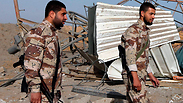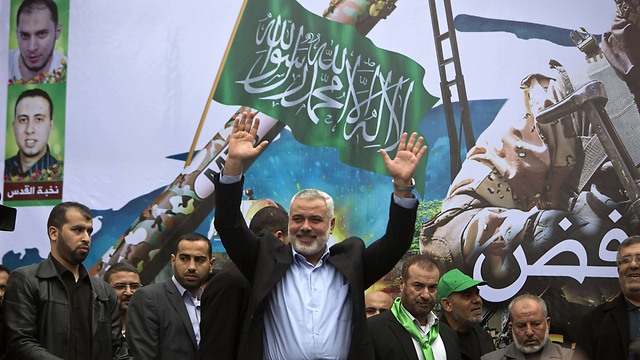
Hamas' security forces in Gaza. Enjoy more freedom of action than Israel
Photo: Reuters

Former Mossad chief Efraim Halevy
Photo: Gilad Kavalerchik
Recently, more and more players in the international arena – states and non-state actors – have been in need of a term expressing a situation in which another player is both a friend and an enemy at the same time. They have begun referring to them as "frenemies."
Moreover, Hamas enjoys more freedom of action than the international public opinion would allow Israel. It is quicker and more efficient and is unrestrained towards the shared rival.

The frenemy has a complicated relationship with its surroundings – it fights one rival, thereby making a significant contribution to one of its other enemies. Hamas, for example, is in a state of war with Israel, while its battle against other organizations in the Gaza Strip, which reject its authority, serves Israel's security needs.
Quiet Dialogue
Analysis: The main achievement of Operation Protective Edge is concealed in the fact that Israel and Hamas have discovered no one is going to help them and they will have to get along on their own.
The situation is more complicated in the north. There is a much higher number of non-state actors – Hezbollah, Jabhat al-Nusra, al-Qaeda, the Islamic State, the Free Syrian Army. Each of them inflicts casualties on Israel's enemies. The actual battle between the different players weakens each of them vis-à-vis Israel. It's possible that a frenemy will develop among the players in the north as well.

Hamas leader in Gaza, Ismail Haniyeh. If the recent talks mature into an agreement between Israel and Hamas for a limited period of time, it should be into the first stage of a new road (Photo: AFP)
A new reality requires new strategies and tactics:
First of all, acknowledging the difference between the various non-state actors and treating each of them specifically. The generalizing statement that they are all homogenous terrorists is no longer valid.
Secondly, abandoning the fundamental approach which rejects any diplomatic contact with terrorists. This approach prevents Israel from using vital tools for studying the enemy and affecting the way it thinks.
Thirdly, ranking the players according to cost-benefit considerations and rewarding those who contribute to our security interest.
Fourthly, designing a style and content for a serious and businesslike discourse with some of the new players according to Israel's interest. Israel must decide what to demand from one group or another and what to give it in return. Instead of a policy of calm in exchange for calm, it should develop a more dynamic policy, which seeks to change basic situations in favor of both sides of the discourse.
Finally, instead of judging the environment we live in, we should put more effort in finding ways to live with it. For example, as the flow of materials and goods into the Gaza Strip increases, contact is expanded between Israel and the Gazans at the border crossing and through modern means of communication which break through barriers and physical borders. We must utilize them to the fullest rather than restrict them.
If the recent talks mature into an agreement between Israel and Hamas for a limited period of time, it will be necessary to turn it into the first stage of taking a new road. The tactic must lead to a strategy of an ongoing dialogue. The strength of every agreement will always depend on the relations between Israel's citizens on this side of the border and the Arabs on its other side.
An official source was quoted recently as saying that we have calm even without giving the Palestinians in Gaza a seaport and an airport. Without addressing these two ambitions, the recent talks prove that the "calm for calm" formula is outdated. Such an approach guarantees another round of fighting.
The official rhetoric on both sides is expected to continue, but that shouldn't stop the two sides from finding routes to a less aggressive discourse. Israel and Hamas will continue preparing for the next rounds of fighting as if there is no other alternative, and perhaps there really isn't.
But if the fourth round in Gaza breaks out as a predestination without other alternatives being examined, we won't be able to argue that we were forced into an "inevitable war" again. We won't be able to say that to the world and, more importantly, we won't be able to look straight into the eyes of Israel's citizens and tell them that.
Efraim Halevy is a former Mossad chief.
















